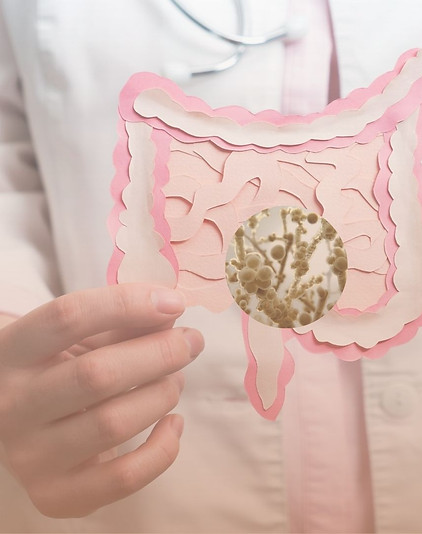
Personalised Support for
Thyroid Health
HASHIMOTO’S . GRAVES’ . HYPOTHYROIDISM . POSTPARTUM & MENOPAUSE

At The Autoimmune Clinic, we specialise in thyroid dysfunction through a functional medicine lens, recognising that hormone imbalance is often the result of immune, nutritional, gut-related and lifestyle factors.
WE LOOK BEYOND YOUR TSH LEVELS TO UNCOVER THE POSSIBLE ROOT CAUSES OF THYROID DYSFUNCTION—INCLUDING AUTOIMMUNITY, HORMONAL SHIFTS, NUTRIENT DEFICIENCIES AND CHRONIC INFLAMMATION.
Are you feeling exhausted, foggy, anxious, or gaining weight despite “normal” blood test results? Have you been told your thyroid is fine—but you know something isn’t right?
At The Autoimmune Clinic, we specialise in functional medicine support for thyroid conditions such as Hashimoto’s disease, Graves’ disease, hypothyroidism, postpartum thyroiditis, and hormone-triggered thyroid dysfunction. We work with individuals who feel unheard, undiagnosed, or under-treated—and are ready for a more comprehensive, root-cause approach.
Meet Claire,
Your thyroid health expert
In this video, Claire explains why carbohydrates are not aways a bad thing, and why they are important for thyroid function and hormone production.
Claire's interest in this field grew from personal experience. After the birth of her two children, she was diagnosed with Hashimoto’s, an autoimmune thyroid condition.
That moment really changed the direction of her life. She wanted to understand how nutrition could help her manage her own health while also supporting the wellbeing of her young family, including her husband who worked irregular shifts."
You can read more about Claire HERE .
Thyroid dysfunction is more than just tiredness.
THE THYROID GLAND IS A KEY REGULATOR OF METABOLISM AND HORMONE SIGNALING
Thyroid disorders are incredibly common—especially in women—and yet many people struggle for years without clear answers. Conventional testing often includes only TSH, missing the bigger picture of what’s happening with hormone conversion, autoimmunity, nutrient status, and stress resilience.
At our clinic, we go beyond TSH to understand:
✔️ Why your thyroid may be underperforming
✔️ Whether autoimmunity (like Hashimoto’s or Graves’) is present
✔️ How your gut, hormones, and nervous system may be contributing
✔️ What’s standing in the way of you feeling better
We support you with holistic, individualised thyroid care—including testing, lifestyle changes, nutrition, supplementation, and referrals for personalised thyroid hormone therapy.
Common symptoms of thyroid dysfunction may include:
FATIGUE OR WIRED-BUT-TIRED ENERGY
Low thyroid function slows energy production at the cellular level. You may feel constantly tired, unrefreshed on waking, or fatigued after minimal activity. Some also feel overstimulated but exhausted—often linked to adrenal stress.
BRAIN FOG OR POOR CONCENTRATION
Thyroid hormones are essential for clear thinking. When levels are low, you may struggle with memory, focus, or finding words. This is common in Hashimoto’s and often worsened by inflammation or gut-brain disruption.
WEIGHT GAIN OR DIFFICULTY LOSING WEIGHT
An underactive thyroid reduces metabolic rate, making it harder to lose weight. Many clients gain weight despite healthy eating. Fluid retention and poor T4-to-T3 conversion can also play a role.
COLD HANDS AND FEET
Thyroid hormones help regulate circulation. When levels are low, you may feel cold even in warm rooms—especially in your hands, feet, or nose. Poor peripheral blood flow is a typical feature of hypothyroidism.

CONSTIPATION OR SLUGGISH DIGESTION
Low thyroid levels slow gut motility. This can lead to constipation, bloating, or incomplete bowel movements. It may also contribute to bacterial overgrowth like SIBO or impaired enzyme release.

HAIR LOSS OR DRY SKIN
Reduced thyroid hormone affects skin and hair renewal. You may notice thinning hair, especially outer eyebrows, or dry, flaky skin. These issues are often worsened by low zinc, selenium, or iron.
DEPRESSION OR ANXIETY
Mood and mental resilience are affected by thyroid hormones. Hypothyroidism may cause low mood and apathy, while hyperthyroidism is more often linked to anxiety, panic, or restlessness.
IRREGULAR OR HEAVY PERIODS
Thyroid dysfunction disrupts hormone balance and ovulation. Hypothyroidism may lead to heavy, prolonged periods. Hyperthyroidism may cause missed or light cycles, and worsen PMS symptoms.
FERTILITY CHALLENGES OR MISCARRIAGE
Thyroid hormones are key for ovulation and early pregnancy. Even mild dysfunction or raised thyroid antibodies can affect fertility or increase miscarriage risk, especially in autoimmune thyroid disease.
PALPITATIONS, SWEATING OR HEAT INTOLERANCE (IN HYPERTHYROIDISM)
Excess thyroid hormone speeds up metabolism. This can lead to heart palpitations, overheating, sweating, shakiness, or insomnia—especially common in Graves’ disease or postpartum thyroid flare-ups.

Hashimoto's Thyroiditis
HASHIMOTO’S IS THE MOST COMMON CAUSE OF HYPOTHYROIDISM IN WOMEN
The most common cause of low thyroid function in women. Hashimoto’s is an autoimmune condition, meaning it is first and foremost a disease of the immune system—not the thyroid. In Hashimoto’s, your immune system mistakenly targets and attacks the thyroid gland, leading to chronic inflammation and a gradual decline in hormone production.
Typical symptoms include:
• Fatigue and low energy
• Brain fog, low mood, and anxiety
• Weight gain and fluid retention
• Cold sensitivity
• Hair thinning and dry skin
• Irregular or heavy periods
• Constipation and bloating
• Difficulty conceiving or miscarriage
Many clients with Hashimoto’s are told they’re “fine” because their TSH is still within the conventional range—even when thyroid antibodies are elevated and symptoms persist.
It’s important to understand that Hashimoto’s is not a thyroid issue. Because the issue lies with the immune system, many people continue to be inflamed and feel unwell—even after being prescribed the correct dose of thyroid hormone replacement.
Symptoms such as fatigue, brain fog, weight gain, or anxiety may linger if the underlying immune dysfunction and inflammation are not addressed.
At The Autoimmune Clinic, we go beyond medication. Our focus includes calming the autoimmune response, restoring gut-immune balance, correcting nutrient deficiencies, and supporting hormone and nervous system health—so clients don’t just stabilise their blood tests, but actually feel better.

Other common thyroid conditions we support
In addition to Hashimoto’s which accounts for the majority of thyroid disorders, we also support a wide range of other thyroid-related concerns. These include subclinical hypothyroidism, where symptoms are present but blood tests fall within the “normal” range; euthyroid sick syndrome, often triggered by chronic illness or stress; thyroid nodules and goitre, which may or may not affect hormone levels; and congenital or post-surgical hypothyroidism.
We also work with individuals navigating complex thyroid cases where symptoms persist despite being on medication. Our goal is to understand the full context of your thyroid health—including hormone function, immune activity, nutrient status, and related gut or adrenal imbalances—so that we can create an individualised plan for recovery.


Do You Suspect Hypothyroidism, Hyperthyroidism or Hashimoto’s?
Where to Start
CONVENTIONAL & FUNCTIONAL TESTING
When it comes to thyroid health, testing is often the first place people are let down. Many clients come to us having been told their thyroid is “normal” based on a single TSH reading—yet they continue to experience fatigue, weight changes, mood issues, and more.
At The Autoimmune Clinic, we take a more complete and functional approach to testing. We look at how thyroid hormones are produced, activated, converted, and utilised at the tissue level. We also assess whether autoimmunity or nutrient imbalances are interfering with thyroid function.
CORE THYROID MARKERS
These are the essential tests we run as a baseline in almost every thyroid case:
-
TSH (thyroid-stimulating hormone) – signals how hard your brain is working to stimulate the thyroid
-
Free T4 – measures the inactive thyroid hormone produced by the gland
-
Free T3 – the active thyroid hormone that powers metabolism, mood, and energy
-
Reverse T3 (optional) – a blocking form of T3 that can rise under stress, inflammation or chronic illness
-
Anti-TPO and anti-TG antibodies – used to diagnose Hashimoto’s thyroiditis
-
TSI antibodies – used to diagnose Graves’ disease
We find that many people feel unwell even when TSH is within the “normal” range—especially if T3 is low, conversion is impaired, or antibodies are elevated. These subtleties are often missed in standard care.
By assessing the interplay between thyroid, adrenal, and sex hormones, we’re able to tailor interventions that support the whole endocrine system—not just one gland in isolation.
ADDITIONAL TESTING
Depending on your case history, symptoms, and goals, we may also recommend:
Nutrient Testing:
-
Ferritin, iron studies, B12, folate, zinc, selenium, vitamin D, iodine
These nutrients are critical for thyroid hormone production and cellular uptake. Even mild deficiencies can impact energy, mood, and metabolism.
Hormone & Adrenal Testing:
-
Adrenal Stress Profile (saliva test) – Measures cortisol levels across the day, This gives insight into adrenal reserve, stress resilience, and circadian rhythm, all of which influence thyroid hormone conversion and energy regulation.
-
Serum Hormone Testing – May include oestradiol, progesterone, LH, FSH, prolactin, and DHEAS. This can be especially helpful for assessing cycle-related symptoms, irregular periods, and fertility concerns alongside thyroid function
Gut Health Testing
-
SIBO breath test – checks for bacterial overgrowth affecting nutrient absorption and motility
-
Stool analysis – screens for dysbiosis, inflammation, enzyme output, and pathogens

Thyroid dysfunction after
pregnancy
After childbirth, the immune system—which is naturally suppressed during pregnancy to protect the baby—undergoes a rapid rebound. For some women, this shift can trigger postpartum thyroiditis, an autoimmune flare affecting the thyroid gland.
This is particularly common in women with existing thyroid antibodies (e.g. anti-TPO), a personal or family history of autoimmune conditions, or previous episodes of postpartum imbalance.
Postpartum thyroiditis typically follows a biphasic pattern. The first phase is often hyperthyroid, with symptoms such as insomnia, anxiety, heart palpitations, and restlessness. This can occur within the first 1–3 months after birth, but is frequently misdiagnosed as postpartum anxiety or dismissed entirely.
The second phase tends to be hypothyroid, emerging around 4–8 months postpartum and marked by exhaustion, low mood, hair loss, weight gain, dry skin, and brain fog.
While some women recover fully within 12 months, many are left with permanent hypothyroidism, especially if thyroid antibodies remain elevated. This risk increases with each subsequent pregnancy.
Thyroid dysfunction during perimenopause and menopause
During perimenopause and menopause, fluctuating and declining levels of oestrogen and progesterone place new demands on the endocrine system. These hormonal shifts can impair thyroid hormone availability and receptor sensitivity, meaning the body may struggle to use thyroid hormones effectively, even if levels appear normal on a standard blood test.
This is why so many women experience increased fatigue, brain fog, sleep disturbances, low mood, and weight changes during midlife. These symptoms are often chalked up to “just hormones,” but in many cases, thyroid dysfunction or Hashimoto’s disease is emerging or worsening during this transition.
Falling oestrogen can also disrupt the conversion of T4 to T3, the active thyroid hormone—while declining progesterone may affect adrenal function and further impact thyroid output. At the same time, years of cumulative stress, nutrient depletion, or gut imbalances may begin to manifest more clearly.
We work closely with perimenopausal and menopausal women to assess thyroid function comprehensively, taking into account hormone interactions, immune trends, nutritional status, and adrenal resilience. By tailoring thyroid support to your life stage, we help reduce the burden of overlapping symptoms and promote steadier energy, metabolism, cognition, and mood.

BOOK YOUR DISCOVERY CALL WITH US TODAY AND START YOUR JOURNEY BACK TO HEALTH >
The Thyroid–Gut–Immune Connection
THE THYROID DOES NOT OPERATE IN ISOLATION. ITS FUNCTION IS DEEPLY INFLUENCED BY THE HEALTH OF THE GUT, THE STATE OF THE IMMUNE SYSTEM, AND THE BODY’S INFLAMMATORY LOAD.
The thyroid does not operate in isolation. Its function is deeply influenced by the health of the gut, the state of the immune system, and the body’s inflammatory load. When one of these systems is out of balance, the others often follow. This is particularly true in autoimmune thyroid conditions like Hashimoto’s and Graves’ disease.
At The Autoimmune Clinic, we often work with clients who experience both thyroid dysfunction and digestive symptoms such as IBS, SIBO, bloating, reflux, constipation, diarrhoea, or multiple food sensitivities. These issues are not coincidental—they are part of a broader pattern of dysregulation that affects the gut–thyroid–immune axis.

LOW STOMACH ACID OR ALTERED GUT MOTILITY
These are often caused by hypothyroidism, can slow digestion and promote bacterial overgrowth in the small intestine (SIBO). This further impairs nutrient absorption and increases intestinal inflammation.

SIBO & DYSBIOSIS
SIBO and dysbiosis reduce absorption of essential nutrients like zinc, selenium, iron, and B12—all of which are critical for thyroid hormone production, activation, and tissue response. Even if your diet is nutrient-dense, you may still be undernourished at the cellular level.
INTESTINAL PERMEABILITY

Intestinal permeability, (or "leaky gut") allows undigested food particles, microbes, and inflammatory compounds to cross the gut lining and interact with the immune system. This can drive or worsen autoimmune thyroid activity and is often a key trigger for Hashimoto’s.

CHRONIC GUT INFLAMMATION
Gut inflammation and microbial by-products (like LPS) can interfere with T4-to-T3 conversion, meaning your body struggles to activate thyroid hormone even if blood levels appear “normal.” This can leave you feeling tired, foggy, and metabolically flat.



Thyroid Health, Food, and Autoimmunity
Food can be a powerful factor in thyroid health. While there is no one-size-fits-all diet for hypothyroidism, Hashimoto’s, or Graves’ disease, certain food proteins are more likely to act as triggers for immune reactivity.
Gluten, dairy, and sometimes nightshades (such as tomatoes, peppers, and aubergines) are common culprits for some individuals.
This is partly explained by molecular mimicry, a process where the immune system mistakes certain food proteins for thyroid tissue, driving inflammation. For some, reducing or removing these foods can make a significant difference, but this should always be done in a way that does not become overly restrictive or nutritionally depleting.
Iodine is another important factor to consider. While iodine is essential for thyroid hormone production, too much iodine can be highly triggering, especially in those with Hashimoto’s. We have seen clients react strongly to iodine supplementation and even to high-iodine foods, sometimes triggering what feels like a “thyroid storm.” There is no universal approach, some people do better with cautious iodine repletion, while others need to minimise it.
For this reason, it is always best to work with a practitioner to carefully assess your diet, symptoms, and lab results.
What works for one person may not work for another. Our aim is always to look at the bigger picture, diet, environment, stress, gut health, infections — and piece together the factors that may be driving your thyroid condition, so you can move forward with clarity and confidence.

Our approach to supporting your thyroid health
SUPPORT & TESTING IS HIGHLY INDIVIDUALISED—BASED ON YOUR UNIQUE PROFILE
Everything we do is based on your individual story, test results, and long-term goals—not just lab numbers. Our goal is to help you move beyond symptom suppression and into true thyroid health—where you feel energised, mentally clear, and in control of your wellbeing.
Although there is no one set protocol for supporting thyroid health, our key strategies for supporting our clients with a thyroid disorder and their overall well-being include or more of the following:
Targeted nutritional therapy
Including key nutrients such as iron, selenium, zinc, tyrosine, and iodine (if appropriate), alongside anti-inflammatory compounds like omega-3 fatty acids, curcumin, and quercetin. These nutrients support thyroid hormone synthesis, immune balance, and tissue repair.
Individualised dietary support
Your diet plays a crucial role in thyroid health, but there’s no one-size-fits-all approach. We tailor dietary recommendations based on the nature of your thyroid disorder—whether autoimmune, post-surgical, nutrient-depleted, or hormonally driven. For Hashimoto’s, this may involve an anti-inflammatory or gluten-free approach; for Graves’, it might focus on calming the nervous system and supporting nutrient repletion. We also consider digestive capacity, food sensitivities, blood sugar regulation, and hormonal phase.
Immune system modulation / regulation
Aiming to reduce thyroid antibody activity and calm systemic inflammation. This involves identifying and addressing triggers such as gut infections, food reactions, mould, or environmental toxins, while supporting immune tolerance through the gut and nervous system.
Stress and nervous system support
Chronic stress can impair thyroid hormone conversion and fuel autoimmune activity. We use tools such as vagus nerve stimulation, breathwork, somatic practices, sleep support, and adaptogens to help regulate the stress response and restore balance.
Comprehensive gut healing
Many thyroid clients also experience digestive symptoms or have coexisting SIBO, leaky gut, or dysbiosis. We work to repair the gut lining, restore motility, improve enzyme function, and rebalance the microbiome to support nutrient absorption and reduce immune reactivity.
Hormonal balancing
Whether you're postpartum, perimenopausal, or in full menopause, sex hormone fluctuations can strongly influence thyroid function. We offer support through functional hormone testing, nutritional and botanical therapy, and (when needed) coordination with prescribing partners.
Frequently Asked Questions About Hashimoto's
We understand that starting your journey to better health can raise many questions. Below are answers to some of the most common questions we receive about managing Hashimoto’s at the Autoimmune Clinic.






